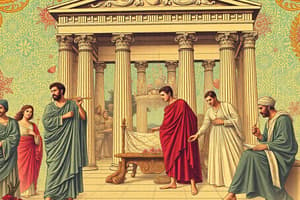Podcast
Questions and Answers
What significant event occurred in Athens in 403/2 BC?
What significant event occurred in Athens in 403/2 BC?
- The establishment of a monarchy
- The defeat of the Spartans
- The re-assertion of democracy (correct)
- The formation of a new council
What was the impact of the assembly after the re-assertion of democracy?
What was the impact of the assembly after the re-assertion of democracy?
- The assembly could only discuss matters on the agenda set by the boule. (correct)
- The assembly had increased power to make laws.
- The assembly was completely abolished.
- Individual citizens could propose laws freely.
How did the People’s Court influence Athenian democracy after 403/2 BC?
How did the People’s Court influence Athenian democracy after 403/2 BC?
- It applied checks on the council's decisions.
- It could overturn decisions made by the assembly. (correct)
- It had the power to create laws independently.
- It was dissolved entirely.
What does the passage suggest about the nature of Athenian politics during this period?
What does the passage suggest about the nature of Athenian politics during this period?
What prompted the first oligarchic coup in Athens during the Peloponnesian War?
What prompted the first oligarchic coup in Athens during the Peloponnesian War?
What was a key limitation on citizens in the Athenian assembly after the re-assertion of democracy?
What was a key limitation on citizens in the Athenian assembly after the re-assertion of democracy?
What was a result of the second oligarchic coup in 404/3 BC?
What was a result of the second oligarchic coup in 404/3 BC?
What question does the passage raise about the assembly in Athenian politics?
What question does the passage raise about the assembly in Athenian politics?
What did Thucydides highlight about Athenian democracy in his account of Pericles' funeral speech?
What did Thucydides highlight about Athenian democracy in his account of Pericles' funeral speech?
According to Herodotus, how did Greek democracy compare to foreign governments like the Persian Empire?
According to Herodotus, how did Greek democracy compare to foreign governments like the Persian Empire?
What was Aristotle's belief about non-Greeks regarding governance?
What was Aristotle's belief about non-Greeks regarding governance?
What is suggested about the Athenian view of democracy in the content?
What is suggested about the Athenian view of democracy in the content?
How did criticisms of Athenian democracy influence their understanding of political ideals?
How did criticisms of Athenian democracy influence their understanding of political ideals?
What is a primary reason for the focus on Greek achievements in studies of ancient politics?
What is a primary reason for the focus on Greek achievements in studies of ancient politics?
What was the general attitude of the Athenians toward their unique brand of democracy?
What was the general attitude of the Athenians toward their unique brand of democracy?
What underlying sentiment can be inferred from the Athenian perspectives on democracy?
What underlying sentiment can be inferred from the Athenian perspectives on democracy?
Why should scholars be cautious about making general inferences from Greek texts?
Why should scholars be cautious about making general inferences from Greek texts?
In the context of Greek democracy, what does the frequent juxtaposition by Herodotus signify?
In the context of Greek democracy, what does the frequent juxtaposition by Herodotus signify?
What aspect of Athenian democracy is notably under-researched according to the content?
What aspect of Athenian democracy is notably under-researched according to the content?
What does the term 'Athenian Revolution' imply in the context provided?
What does the term 'Athenian Revolution' imply in the context provided?
What does the content suggest about the understanding of democracy in ancient Greece?
What does the content suggest about the understanding of democracy in ancient Greece?
What challenge does the preservation of ancient texts pose for historians?
What challenge does the preservation of ancient texts pose for historians?
What is implied about the fragments of Greek texts that remain?
What is implied about the fragments of Greek texts that remain?
Which of the following could be a misconception about Greek democracy based on the content provided?
Which of the following could be a misconception about Greek democracy based on the content provided?
What happens to a judge who reverses his judgment according to the fifth law?
What happens to a judge who reverses his judgment according to the fifth law?
What is the penalty imposed on a judge who reverses his judgment?
What is the penalty imposed on a judge who reverses his judgment?
Who had the authority to try more complex civil and criminal cases in later Babylonian law?
Who had the authority to try more complex civil and criminal cases in later Babylonian law?
Which feature of the Babylonian judicial system is highlighted as being democratic?
Which feature of the Babylonian judicial system is highlighted as being democratic?
In terms of judicial duties in ancient Babylon, who besides judges was involved?
In terms of judicial duties in ancient Babylon, who besides judges was involved?
What significant right does the assembly have regarding severe penalties?
What significant right does the assembly have regarding severe penalties?
The fifth law mandates a serious consequence for judges. What is an aspect of the consequence?
The fifth law mandates a serious consequence for judges. What is an aspect of the consequence?
Which ancient civilization's judicial system is compared to Babylon in the content?
Which ancient civilization's judicial system is compared to Babylon in the content?
Which group was NOT excluded from Athenian citizenship according to the content?
Which group was NOT excluded from Athenian citizenship according to the content?
What factor primarily limited the inclusion of those with lower socio-economic status in Athenian citizenship?
What factor primarily limited the inclusion of those with lower socio-economic status in Athenian citizenship?
Which statement reflects the impact of education on Athenian citizenship?
Which statement reflects the impact of education on Athenian citizenship?
Why might people with disabilities have been excluded from Athenian citizenship?
Why might people with disabilities have been excluded from Athenian citizenship?
What was a consequence of the payment for attendance being introduced?
What was a consequence of the payment for attendance being introduced?
In contrast to classical Athens, how were citizenship and participation viewed in the ancient Middle East?
In contrast to classical Athens, how were citizenship and participation viewed in the ancient Middle East?
What characterizes the Athenian democracy concerning citizenship?
What characterizes the Athenian democracy concerning citizenship?
What was a common factor for exclusion from citizenship in Athenian society?
What was a common factor for exclusion from citizenship in Athenian society?
Study Notes
Athenian Democracy vs. Primitive Democracy
- Greek democracy is often emphasized for its unique principles and historic significance, despite existing criticisms.
- Existing records from ancient Greece, particularly from the fifth century BC, are scarce, leading to cautious interpretations of their political system.
- Greek texts on democracy may reflect a biased view, focusing on Athenian achievements while overlooking or misrepresenting other democratic practices, such as those in the ancient Middle East.
Historical Perspectives
- Thucydides described Athenian democracy as a model for others, contrasting it against foreign tyrannies such as the Persian Empire.
- Herodotus highlighted the concepts of liberty and egalitarianism within Greek democracy, presenting it as opposed to the oppression found in non-Greek societies.
- Aristotle posited that non-Greeks naturally accepted slavery, further distinguishing Greek political ideals from others.
Fluctuations in Athenian Political Structure
- Athenian democracy saw significant upheaval due to two oligarchic coups (411/10 BC and 404/3 BC) during the Peloponnesian War, which weakened democratic power.
- After the re-establishment of democracy in 403/2 BC, the assembly's power was diminished, limiting public agenda-setting and introducing the possibility for judicial overturns by the People’s Court.
Judicial and Assembly Dynamics
- Judicial responsibilities were delegated to various officials in both Athens and Babylon, with assemblies holding significant sway over major criminal and civil cases in both societies.
- The ability of assemblies to issue severe punishments, including death sentences, indicates a democratic element in Babylonian legal practices, akin to those in Athens.
Inclusivity and Limitations of Citizenship
- Athenian democracy was not truly representative, as significant portions of the population (including slaves, women, foreigners, and marginalized individuals) were systematically excluded from citizenship.
- Low socio-economic status and limited education further restricted participation in Athenian democracy, which was dominated by elite classes.
- Ancient Middle Eastern democratic practices allowed for broader participation and different conceptions of citizenship compared to Athenian models, suggesting more inclusive approaches to governance.
Studying That Suits You
Use AI to generate personalized quizzes and flashcards to suit your learning preferences.
Description
Explore the contrasts between Athenian democracy and other forms of primitive democracy in this quiz. Dive into historical perspectives provided by Thucydides, Herodotus, and Aristotle, and examine the unique principles that defined Greek political systems. Consider how biases in historical records shaped our understanding of these democratic practices.




